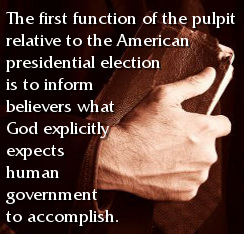Pulpit Ministry & the Presidential Election, Part 2
 Posted with persmission from Theologically Driven.
Posted with persmission from Theologically Driven.
As iron sharpens iron,
one person sharpens another. (Proverbs 27:17)
 Posted with persmission from Theologically Driven.
Posted with persmission from Theologically Driven.
 Posted with permission from Theologically Driven.
Posted with permission from Theologically Driven.
As an interim pastor charged in part with exposing the Scriptures so as to inform the moral and ethical decision-making of a congregation, I have been forced to consider the role that the pulpit should play in the upcoming presidential election. The simplest model, and one that will no doubt feature prominently in many pulpits over the next few weeks, is what I’ll call the values/proof-text model. It has two basic variations:
If one could manage to be completely objective with this approach, then it is probable that one party’s list of biblical values and the supporting proof-texts would be longer than the other’s. Or, alternately, one might decide that irrespective of the length of the lists, the weight of one or more of the items on the list (say, abortion) is such that the argument for one side or the other is sealed.
Discussion